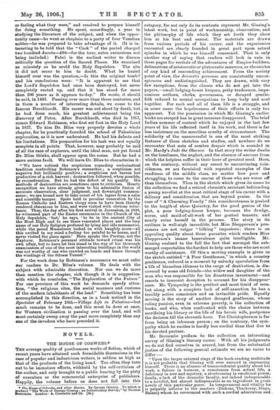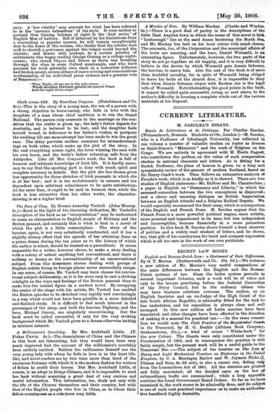NOVELS.
'ab HOUSE OF COBWEBS.* THE average quality of posthumous works of fiction, which of recent years have attained such formidable dimensions in the case of popular and industrious writers, is seldom as high as that of the products of the living hand. Too often they turn out to be immature efforts, withheld by the self-criticism of the author, and only brought to a public hearing by the piety of executors or the commercial enterprise of publishers. Happily, the volume before us does not fall into this * The House of Cobwebs, and other Stories. By George °frail:Lg. To which is prefixed "The Work of George Gissing: an Introductory Survey." by Thomas 6e000mbe. London : A. Constable and Co. [6s.]
category, for not only do its contents represent Mr. Gissing's latest work, but in point of workmanship, observation, and the philosophy of life which they set forth they show
him at his beat and sanest. The materials aro drawn from various periods of his career, and the experiences recounted are clearly founded in great part upon actual episodes in which he was himself concerned. That is only another way of saying that readers will look in vain in
these pages for recitals of the adventures of Empire-builders, delineations of aristocratic or plutocratic manners, or chronicles
of any kind of resounding achievement. From the society point of view, the dramatis personae are consistently uncon-
spicuous and undistinguished. They are drawn, with very few exceptions, from the classes who do not get into the papers,—small lodging-house keepers, petty tradesmen, impe- cunious authors, clerks, governesses, or decayed gentle- folk reduced to menial occupations to keep body and soul together. For each and all of them life is a struggle, and in some cases the hopelessness of their efforts is only too apparent. Yet the pessimism in which Mr. Gissing's earlier books are steeped has in great measure disappeared. The brief Indian summer of content which he enjoyed in the last few years of his life reflected itself in his work, and there is far less insistence on the merciless cruelty of circumstance. The solidarity of the unsuccessful is one of the most striking features of these sketches and studies, and nowhere do we encounter that note of sombre despair which is sounded in
Mr. Hardy's Jude the Obscure. In that story the writer dwells on the loneliness, the neglect, and the absence of succour from which the helpless suffer in their hour of greatest need. Here,
on the contrary, without any resort to unconvincing coin- cidences, we are furnished with repeated examples of the readiness of the middle class, no matter how poor and struggling, to come to the rescue of those who are worse off than themselves. Thus in the sketch which gives its name to the collection we find a retired chemist's assistant befriending a young novelist at the most critical stage of his career with a delicacy and consideration that are beyond praise. In the
case of " A Charming Family " this considerateness is pushed to the length of sheer Quixotry, for the good genius of the
plot, a poor lodging-house keeper, becomes the drudge,
nurse, and maid-of-all-work of her genteel tenants, and nearly ruins herself in the process. The story in its
outlines is well-nigh incredible, but Miss Shepperson's pen- sioners are not vulgar " bilking" impostors ; there is an appealing quality about these parasites which renders Miss Shepperson's insane benevolence quite intelligible. Mr. Gissing realised to the full the fact that amongst the sub- merged respectables the hardest to help are those who are most
worthy of assistance. Of this a moving example is given in the sketch entitled " A Poor Gentleman," in which a country gentleman, reduced in a moment by unlucky speculation from
a life of blameless idleness to the verge of destitution, is dis- covered by some old friends—the widow and daughter of the man who was responsible for his disastrous investment—and resorts to innocent deception to account for his disappear- ance. Mr. Tymperley is the gentlest and most timid of men.
but along with a complete lack of self-assertion he has a terribly active conscience and an invincible pride. Equally moving is the story of another decayed gentleman, whose ruling passion, even in extreme poverty, is the collection of books, and who, when confronted with the choice between sacrificing his library or the life of his heroic wife, postpones the decision till the eleventh hour. Yet Christopherson is far from being an inhuman person ; on the contrary, the sym- pathy which he excites is hardly less cordial than that due to his devoted partner.
Mr. Seccombe prefixes to the collection an interesting survey of Gissing's literary career. With all his judgments we do not find ourselves in accord, but from the substantial justice of the following general estimate we see no cause to differ :-
"Upon the larger external rings of the book-reading multitude it is not probable that Gissing will ever succeed in impressing himself. There is an absence of transcendental quality about his work, a failure in humour, a remoteness from actual life, a deficiency in awe and mystery, a shortcoming in emotional power, finally, a lack of the dramatic faculty, not indeed indispensable , to a novelist, but almost indispensable as an ingredient in great novels of this particular genre. In temperament and vitality he is palpably inferior to the masters (Dickens, Thackeray, Hugo, Balzac) whom he reverenced with such a cordial admiration and , envy. A low vitality' may account for what has been referred to as the nervous exhaustion' of his style. It were useless to pretend that Gissing belongs of right to the first series' of English Men of Letters. But if debarred by his limitations from a resounding or popular success, he will remain exceptionally dear to the heart of the recluse, who thinks that the scholar does well to cherish a grievance against the vulgar world beyond the cloister; and dearer still, perhaps, to a certain number of enthusiasts who began reading George Gissing as a college night- course ; who closed Thyrza and Demos as dawn was breaking through the elms in some Oxford quadrangle, and who have pursued his work patiently ever since in a somewhat toilsome and broken ascent, secure always of suave writing and conscientious workmanship, of an individual prose cadence and a genuine vein of Penseroso:-
'
Thus, Night, oft see me in thy pale career . . wings, And brooding Darkness spreads his jealous wings, And the night-raven sings.'











































 Previous page
Previous page